THE
EVERYTHING
HEALTH GUIDE TO
ADULT
BIPOLAR
DISORDER
2ND EDITION
A reassuring guide for patients
and families
Dean A. Haycock, PhD
Foreword by Sheldon Whitten-Vile, MD

Copyright 2010, 2006 by F+W Media, Inc. All rights reserved.
This book, or parts thereof, may not be reproduced
in any form without permission from the publisher; exceptions
are made for brief excerpts used in published reviews.
An Everything Series Book.
Everything and everything.com are registered trademarks of F+W Media, Inc.
Published by Adams Media, a division of F+W Media, Inc.
57 Littlefield Street, Avon, MA 02322 U.S.A.
www.adamsmedia.com
ISBN 10: 1-4405-0405-9
ISBN 13: 978-1-4405-0405-1
eISBN 10: 1-4405-0406-7
eISBN 13: 978-1-4405-0406-8
Printed in the United States of America.
10 9 8 7 6 5 4 3 2 1
Library of Congress Cataloging-in-Publication Data
is available from the publisher.
Many of the designations used by manufacturers and sellers to distinguish their products are claimed as trademarks. Where those designations appear in this book and Adams Media was aware of a trademark claim, the designations have been printed with initial capital letters.
This book is intended as general information only, and should not be used to diagnose or treat any health condition. In light of the complex, individual, and specific nature of health problems, this book is not intended to replace professional medical advice. The ideas procedures and suggestions in this book are intended to supplement, not replace, the advice of a trained medical professional. Consult your physician before adopting any of the suggestions in this book, as well as about any condition that may require diagnosis or medical attention. The author and publisher disclaim any liability arising directly or indirectly from the use of this book.
This book is available at quantity discounts for bulk purchases.
For information, please call 1-800-289-0963.
THE EVERYTHING HEALTH GUIDE TO ADULT BIPOLAR DISORDER 2ND EDITION
Dear Reader,
No one who develops a mental disorder is at fault; the cause lies somewhere in the interaction of genes and environment. Bipolar and other disorders have a biological basis, just as any disease that affects other organs in the body.
Emma Parker Bowles suffered from bipolar disorder for years. After she found help and effective treatment, she wrote in an essay, I know I am not the only one. So if reading this helps just one person not to feel so alone, not to feel so lost in the fog, then it was worth it. Just don't suffer in silence. Don't be ashamed. Talk about it. Explore treatment options and find something that will work for you. I leave you with this African proverb: However long the night, the dawn will break.
Picking up a book such as this one is a good first step to learning about the nature of this disease and what you can do about it. If you arm yourself with as much knowledge as you can gather from this and other books, medical authorities, support groups, and people who have bipolar disorder, you will shorten the night.

WELCOME TO THE EVERYTHING HEALTH GUIDE
Everything Health Guides are a part of the bestselling Everything series and cover important health topics like anxiety, postpartum care, and thyroid disease. Packed with the most recent, up-to-date data, Everything Health Guides help you get the right diagnosis, choose the best doctor, and find the treatment options that work for you. With this one comprehensive resource, you and your family members have all the information you need right at your fingertips.
 Alerts
Alerts
Urgent warnings
 Essentials
Essentials
Quick handy tips
 Facts
Facts
Important snippets of information
 Questions
Questions
Answers to common questions
When you're done reading, you can finally say you know EVERYTHING!
PUBLISHER Karen Cooper
DIRECTOR OF ACQUISITIONS AND INNOVATION Paula Munier
MANAGING EDITOR, EVERYTHING SERIES Lisa Laing
COPY CHIEF Casey Ebert
ACQUISITIONS EDITOR Katrina Schroeder
ASSOCIATE DEVELOPMENT EDITOR Hillary Thompson
EDITORIAL ASSISTANT Ross Weisman
EVERYTHING SERIES COVER DESIGNER Erin Alexander
LAYOUT DESIGNERS Colleen Cunningham, Elisabeth Lariviere, Ashley Vierra, Denise Wallace
Visit the entire Everything series at www.everything.com
For Marie E. Culver and Florence Moratelli
Acknowledgments
This is the second Everything book I have done for Adams Media, and Katrina Schroeder edited both of them. She is a pleasure to work with. This book is a revision of the first edition written by Jon P. Block, PhD. I had permission to keep as much of his material in the book as I wanted. In many cases, I have done so where new developments have not made it necessary to change his material. I acknowledge his influence and contributions, which can be found in this revision. As always, I am grateful to Marie E. Culver, who should know what Everything means to an author.
Foreword
Psychiatry is one of medicine's most misunderstood disciplines. Despite frequent portrayals in the popular media, bipolar affective disorder (manic depression) remains one of psychiatry's most mis-understood diagnoses. Many who suffer from this illness believe they don't have it, and there are some who are certain they have it, but don't. Unfortunately, psychiatrists tend to see more of the former, and persuading people, especially young people, that they have a serious mental illness is extremely difficult. While depressed people often know they have a problem, and are often willing to seek treatment, most manic individuals do not see a problem or a need for help. They often put themselves and their loved ones through a number of horrific episodes before they get it. What makes this even more tragic is that good, effective treatments are available, and most people with this illness can live a normal life if they find, and stick with, appropriate treatment.
For those people who wonder if they have bipolar disorder, there is little awareness of the variety of alternative diagnoses that may be more accurate. The right diagnosis is the first step in getting the right treatment.
Psychoeducation is the education offered to people who live with psychological disturbances. Its goal is to help the patient understand and be better able to deal with the illness. It also helps to reinforce the patient's own strengths, resources, and coping skills, so they can become active participants in their health and well-being.
In addition, friends and family members are frequently confused about what is happening to their loved ones. Often, the normal, supportive responses are not helpful, and families are afraid to say or do the wrong thing and potentially make things worse. They wonder what went wrong, what they can do to help, and what the future holds for the patient.

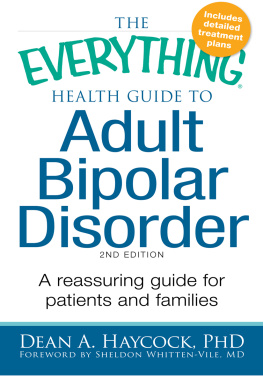

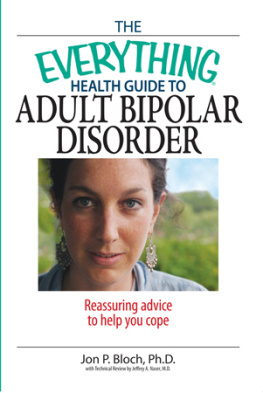
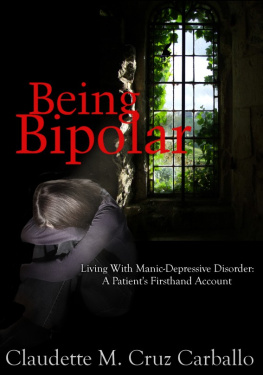
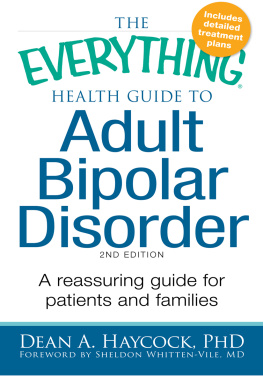
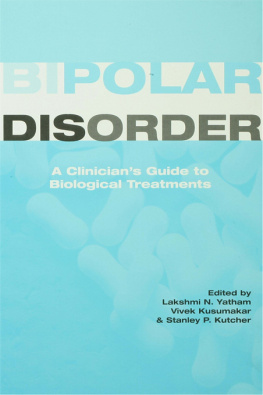
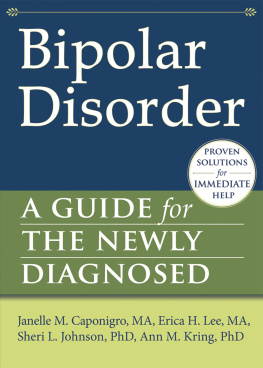


 Alerts
Alerts Essentials
Essentials Facts
Facts Questions
Questions